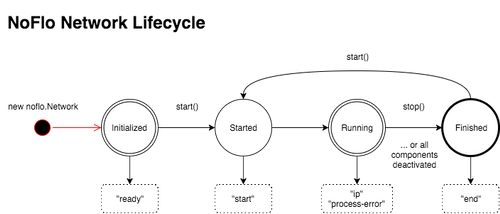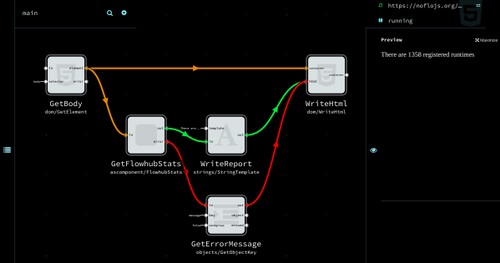NoFlo 0.8 is out now

After several months of work, NoFlo 0.8 is finally out as a stable release. This release is important in that it brings the Process API for NoFlo components to general availability, paving way for the 1.x series.
Process API
We introduced Process API in the 0.7 series last summer, but at that stage it wasn’t deemed good enough for production use. There were issues with features like bracket forwarding, as well as API convenience questions that we’ve since tackled. With NoFlo 0.8 onwards, Process API is the recommended way to write all components.
Here are some of the major features coming to Process API with 0.8:
hasDataandgetDatamethods for dealing with data packets in the inportshasStreamandgetStreammethods for dealing with complete streams of IPs in the inports- Calling
output.doneis now required to signal when component is done processing - Automatic bracket forwarding from and to multiple ports as defined in
forwardBracketsconfiguration - Support for receiving packets from addressable ports using the
[portname, idx]syntax
More information on how to use the API for writing NoFlo components can be found from the Process API guide I wrote back in January.
Big thanks yet again to Vladimir Sibirov for his work pushing Process API to production!
WirePattern
Before Process API, WirePattern was the preferred convenience method used for writing NoFlo components. It made it easy to synchronize data from multiple inports, and to manage lifecycle of asynchronous components. Process API was largely designed to address the learnings we’ve had from the years using WirePattern in production, both the conveniences and the pitfalls.
Since vast majority of current open source NoFlo components use WirePattern, it wasn’t feasible to simply go and deprecate the API. Instead, what we did in the 0.8 cycle was port WirePattern to actually run on top of Process API.
So, when you update to NoFlo 0.8, all WirePattern components will automatically switch to using Process API internally. This means that existing components and graphs should stay working as they always did, except now fully compatible with features like scope isolation, bracket forwarding, and the new network lifecycle.
In 0.8 series we still also ship the original WirePattern implementation, which can be enabled in two ways:
- Passing a
legacy: trueas an option to the WirePattern function. This will cause that component to use the legacy WirePattern iimplementation - Setting
NOFLO_WIREPATTERN_LEGACYenvironment variable to force all WirePattern components to use legacy mode
There should be no reason to use the legacy mode. If you find a backwards compatibility issue forcing you to do so in your projects, please file an issue.
Component and network lifecycle
Another area of focus for 0.8 was the network lifecycle. The legacy component API in NoFlo had no way for components to tell when they’re done processing data, and hence the network wasn’t able to determine accurately when it was finished.
With Process API we give components much better way to handle this — when you’re done processing, call output.done(). Until then the component is expected to be doing work. When all components have deactivated, the network is considered finished:

To support the lifecycle better, we also made both component and network star-up and shutdown asynchronous with callbacks. This ensures every node in a NoFlo network can do everything it needs to initialize or clean up at the right stage of the flow.
The network methods are:
network.start(callback)to start the network. This starts all components and sends the Initial Information Packetsnetwork.stop(callback)to stop the network. This calls all components to shut down, closes connections between them, and clears any in-flight inport buffers
If your component needs to do anything special at start-up or shutdown, the new methods it can provide are:
component.setUp(callback)called when network starts. Component can do self-initialization but should not send anything at this stagecomponent.tearDown(callback)called when network stops. Stateful components can clean their state at this point, and generators should stop generating (remove event listeners, shut down socket connections, etc)
The tearDown method replaces the old shutdown method. While shutdown method still gets called, all components should migrate to the async-capable tearDown in this release cycle.
Deprecated features
The 0.8 series adds deprecation warnings to features that will be removed from the eventual NoFlo 1.x release. You can find a full list from the ChangeLog, but here are some notable ones:
- Synchronous WirePattern usage (switch to
async: trueor port to Process API) noflo.AsyncComponentandnoflo.helpers.MapComponent(should be ported to Process API)noflo.InPortlegacy packet methodsprocess,receiveandcontains- Legacy
noflo.Portandnoflo.ArrayPortimplementations. Use the modernnoflo.InPortandnoflo.OutPortinstead component.errorandcomponent.failmethods. Use WirePattern or Process API error callback instead
By default using a deprecated feature only logs a warning. If you want to make these fatal, set the NOFLO_FATAL_DEPRECATED environment variable. This can be useful for Continuous Integration.
Getting 0.8
NoFlo 0.8.x releases can be found from NPM.
- For Node.js projects, the noflo-nodejs command-line runner has been updated to 0.8
- For browser projects, noflo-browser-app scaffolding has been updated to 0.8
As I write this, the hosted browser runtime is still on 0.7. We will hopefully get it updated shortly.

